


I titled this post ‘how are you?’ in Kikamba because I spent the weekend in rural Kenya at Nyumbani Village in Kamba-land. I also figure I should greet everyone again because I am back on my blog! I took a break from posting because I had midterms last week and Thursday I was sick. My roommate Sophie said on Thursday, “You know you are like a dog right? You’ve marked your territory all over this city!” Sophie had watched me puke first in our toilet at the apartment, then on the side of the road next to the grocery before you enter Kibera, next in a sewage trench in Kibera, again as I leapt from a matatu entering town and then finally in the trash can in our compound. Maybe she was right!
I recovered on a bumpy, squeezed, smelly, sweaty bus to Kwa Vonza, the nearest town to Nyumbani Village. We waited for about an hour people watching on the roadside of the small town, reminiscent of an old western film set, for Nyumbani’s flatbed truck to drive us 14 km into the village. The fresh breeze, the acacia thorn trees, the Pride Rock hills, the donkeys, and the beautiful red clay dirt were stunning from the open bed of the truck. At the village we had speakers explain the concept an ITALIAN Roman Catholic priest had for the three branched program of which Nyumbani Village is a part of. There is Nyumbani Children’s Home (est. 1992) in Karen (a suburb of Nairobi for rich white people/ the suburb was named after Karen Blixen the author of the novel Out of Africa) that cares for children infected with HIV/AIDS, Lea Toto (est. 1998) (Lea Toto means to raise a child/ lea - to raise, toto - child) in the informal settlement to provide home care for children and families with HIV/AIDS, and lastly Nyumbani Village (est. 2006) to care for children and grandparents who have been affected by the HIV/AIDS pandemic. The criteria for admission to the village are to be double orphaned, destitute and no indiscretions. The village has 8 clusters of homes; each home houses 1 grandmother and 10 orphans. The concept is use the grandparents to care for the children and teach cultural values. There are currently 29 grandmothers, 2 grandfathers and 246 children living at the village. The lesson learned at Nyumbani was a lesson in growth. Nyumbani nurtured each project to its potential and has simply continued to expand each branch’s programs to reach more HIV/AIDS affected persons. Nyumbani means home in Kiswahili, and they have truly given a home to many Kenyan’s who otherwise would be left with nothing. It was a weekend of participating in Environment Day at their school, attending mass on Sunday and playing with children in our free time.
Tonight a group of the girls and I had a delightful dinner at an Indian restaurant on Rhapta. After four days of beans, maize and water, Indian spices and naan were delectable! It was definitely the best meal I have eaten yet.
Tomorrow I am heading to Kibera to finish a concept plan for ISSA’s fundraising dinner on Nov. 21 and then I will be meeting with the CCO from Citi Kenya to chat about corporate responsibility in professional youth development. I am interested to hear his opinion on Kenya’s response to the downturn in the US economy. Sometimes I feel like my time here is very much like a very overstuffed taco. Everything is sooo good I want to fit it all in! Tonight was the first drizzly rain we’ve had in Nairobi. It reminded me of home…it was wet and beautiful!
I recovered on a bumpy, squeezed, smelly, sweaty bus to Kwa Vonza, the nearest town to Nyumbani Village. We waited for about an hour people watching on the roadside of the small town, reminiscent of an old western film set, for Nyumbani’s flatbed truck to drive us 14 km into the village. The fresh breeze, the acacia thorn trees, the Pride Rock hills, the donkeys, and the beautiful red clay dirt were stunning from the open bed of the truck. At the village we had speakers explain the concept an ITALIAN Roman Catholic priest had for the three branched program of which Nyumbani Village is a part of. There is Nyumbani Children’s Home (est. 1992) in Karen (a suburb of Nairobi for rich white people/ the suburb was named after Karen Blixen the author of the novel Out of Africa) that cares for children infected with HIV/AIDS, Lea Toto (est. 1998) (Lea Toto means to raise a child/ lea - to raise, toto - child) in the informal settlement to provide home care for children and families with HIV/AIDS, and lastly Nyumbani Village (est. 2006) to care for children and grandparents who have been affected by the HIV/AIDS pandemic. The criteria for admission to the village are to be double orphaned, destitute and no indiscretions. The village has 8 clusters of homes; each home houses 1 grandmother and 10 orphans. The concept is use the grandparents to care for the children and teach cultural values. There are currently 29 grandmothers, 2 grandfathers and 246 children living at the village. The lesson learned at Nyumbani was a lesson in growth. Nyumbani nurtured each project to its potential and has simply continued to expand each branch’s programs to reach more HIV/AIDS affected persons. Nyumbani means home in Kiswahili, and they have truly given a home to many Kenyan’s who otherwise would be left with nothing. It was a weekend of participating in Environment Day at their school, attending mass on Sunday and playing with children in our free time.
Tonight a group of the girls and I had a delightful dinner at an Indian restaurant on Rhapta. After four days of beans, maize and water, Indian spices and naan were delectable! It was definitely the best meal I have eaten yet.
Tomorrow I am heading to Kibera to finish a concept plan for ISSA’s fundraising dinner on Nov. 21 and then I will be meeting with the CCO from Citi Kenya to chat about corporate responsibility in professional youth development. I am interested to hear his opinion on Kenya’s response to the downturn in the US economy. Sometimes I feel like my time here is very much like a very overstuffed taco. Everything is sooo good I want to fit it all in! Tonight was the first drizzly rain we’ve had in Nairobi. It reminded me of home…it was wet and beautiful!
(Pic 1 ~ Sunday Mass with Father Julius; Pic 2 ~ Jess and I pounding maize; Pic 3 ~ Kimanze!)
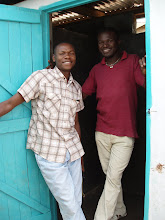
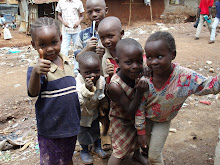
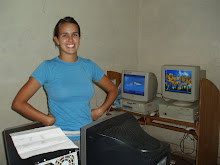
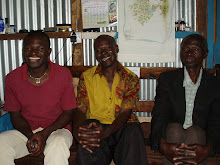

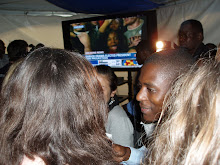
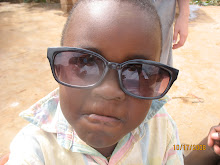

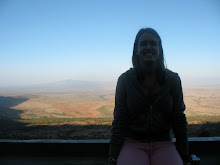
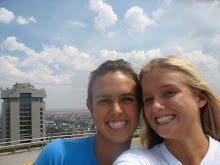
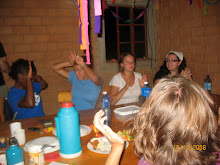
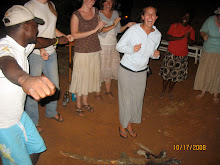
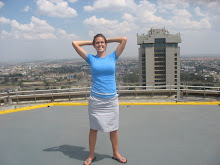
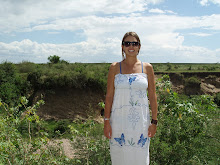
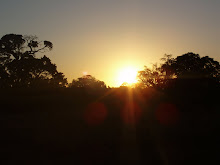
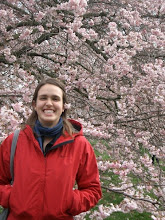
4 comments:
I am glad you're feeling better because that sounds terrible! Luckily it sounds like you had a really great weekend, that's neat that you got to see how each branch of the program has developed over time. I bet you loved being with the kids!
Also, glad to see that Ted pulled through and hooked you up with Citi in Kenya and it will certainly be neat to hear about how changes in our economy will affect theirs.
miss you!
glad you wrote a word...worried about you when your off that long...grandma would say you look skinny...hope your eating enough. Birthday is coming do they do cake? what's their tradition? now sing real loud to yourself....happy b day to me happy b day to me happy b day dear justine....happy b day to me,
love ya, Aunti C
Boy; what an adventure! Keep piling the lettuce on that taco! Get it while you can. Was that the KAREN project we had read about? I bet all went well today, it sounded like your meeting was going to be awesome.
I am glad you wrote too as I was starting to worry. Leave it to me and Aunti C to worry about you. Happy Birthday to you--Happy Birthday to you!! Hope you have a nice day and have something sorta like a cake--maybe a mud pie. Ha-ha!! Take care and be careful.
Love Auntie Barb & Uncle Bob
Post a Comment